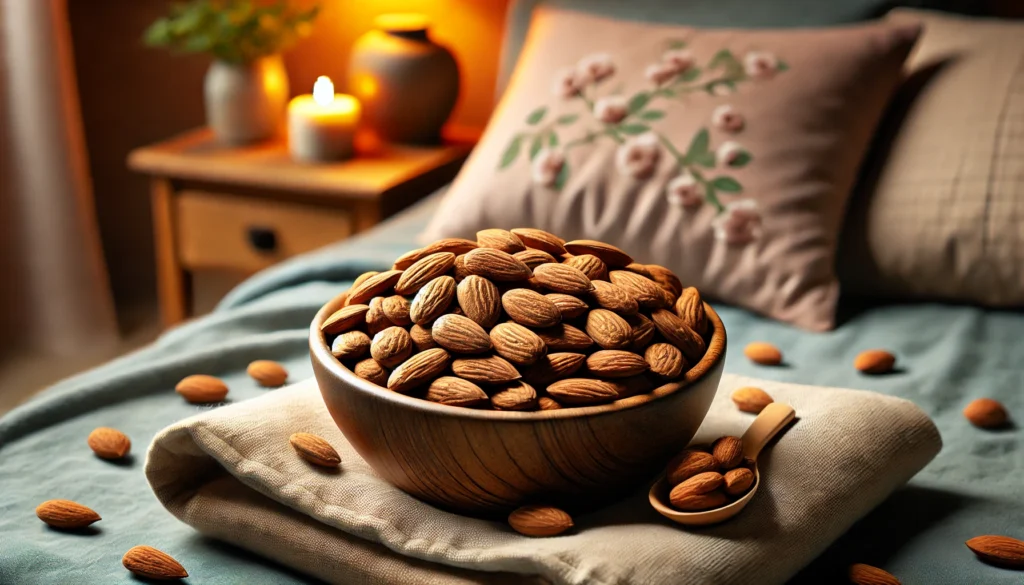Before we dive into specific foods, it’s important to understand the scientific basis that makes certain foods beneficial for sleep. The key components in this process are tryptophan, melatonin, serotonin, and magnesium. These compounds work together to regulate sleep patterns and encourage drowsiness.
Tryptophan: The Sleep-Starting Amino Acid
Tryptophan is an essential amino acid that acts as a precursor to serotonin, a neurotransmitter that affects mood and sleep. Once serotonin is produced, it’s converted into melatonin, a hormone that regulates your sleep-wake cycle. Foods that are high in tryptophan can enhance this pathway, leading to increased melatonin production and better sleep quality.
Tryptophan has been the subject of numerous studies, highlighting its role in sleep regulation. It is often found in protein-rich foods, making it an accessible nutrient for many. Additionally, tryptophan’s role isn’t limited to sleep; it also contributes to mood stabilization, making it a holistic nutrient for mental well-being.
Incorporating tryptophan-rich foods into your diet can be a simple yet effective way to improve sleep. It’s important to note that carbohydrates can help increase the availability of tryptophan in the brain, making it beneficial to pair these foods with a carb source.
Melatonin: The Natural Sleep Hormone
Melatonin is a hormone produced by the pineal gland in the brain, signaling to your body that it’s time to wind down and sleep. While your body naturally produces melatonin, consuming foods high in this hormone can boost its levels, aiding in falling asleep faster and staying asleep longer.
Research has shown that melatonin not only helps with sleep onset but also improves sleep quality. Foods rich in melatonin can be particularly beneficial for people who struggle with insomnia or irregular sleep patterns.
Supplementing with melatonin-rich foods can be a natural and gentle way to enhance sleep, especially when compared to synthetic supplements. These foods can be easily integrated into evening meals or as bedtime snacks to promote a restful night’s sleep.
Magnesium: The Relaxation Mineral
Magnesium plays a crucial role in supporting sleep by activating neurotransmitters that calm the nervous system. Regular consumption of magnesium-rich foods can help reduce symptoms of insomnia and improve overall sleep quality.
Magnesium is involved in over 300 biochemical reactions in the body, including those that regulate sleep. Its calming effect on the nervous system makes it an essential mineral for reducing stress and anxiety, which are common culprits of sleep disturbances.
Incorporating magnesium into your diet can be achieved through various sources, from nuts and seeds to leafy greens. Consistency is key, as regular intake of magnesium-rich foods can significantly enhance its sleep-promoting benefits.
You May Also Like: Essential Vitamins for Better Sleep Quality

Foods That Make You Sleepy
With the scientific groundwork established, let’s explore the top foods that can make you sleepy and how they can be incorporated into your daily meals.
1. Turkey
Turkey is often linked to the post-Thanksgiving nap, serving as a classic example of a food rich in tryptophan. Incorporating turkey into your evening meal can increase the production of serotonin, leading to more melatonin and better sleep.
Beyond its tryptophan content, turkey is a versatile protein that can be used in various dishes, from sandwiches to salads. It’s a lean meat option, making it a healthy choice for those looking to manage weight while improving sleep.
Pairing turkey with carbohydrates, like whole-grain bread or sweet potatoes, can enhance the tryptophan absorption, making your evening meal even more sleep-friendly.
2. Almonds
Almonds are not only a fantastic source of healthy fats but also pack a significant amount of magnesium. Including a handful of almonds in your diet can help relax your muscles and nerves, paving the way for a good night’s sleep.
Almonds are a convenient snack, perfect for those on the go who still want to prioritize their sleep health. They also provide a good dose of protein, which can keep you feeling full throughout the night, reducing midnight snack temptations.
Incorporating almonds into your diet can be as simple as adding them to your morning smoothie or enjoying them as an afternoon snack. Their versatility makes them an easy addition to various meals and snacks.
3. Cherries
Cherries, particularly tart cherries, are one of the few natural sources of melatonin. Drinking a glass of tart cherry juice or snacking on fresh cherries before bed can increase melatonin levels, improving sleep duration and quality.
Tart cherries have been the subject of several studies, with results suggesting significant improvements in sleep for those who consume them regularly. They offer a natural alternative to melatonin supplements, often without the side effects.
Incorporating cherries into your diet can be a refreshing way to boost sleep. Try adding them to yogurt, cereal, or as a topping for desserts to enjoy their benefits in various forms.
4. Kiwi
Research suggests that kiwi can enhance sleep due to its high serotonin content. Eating kiwi fruit an hour before bed has been linked to falling asleep faster and enjoying deeper sleep.
Kiwi is not only beneficial for sleep but is also rich in vitamins C and K, providing additional health benefits. Its natural sweetness makes it a delightful dessert option that supports your sleep goals.
Incorporating kiwi into your nighttime routine can be as simple as slicing it and enjoying it on its own or adding it to a fruit salad for a nutritious and sleep-promoting snack.
5. Chamomile Tea
Chamomile tea is renowned for its calming effects and has been used traditionally as a natural remedy for insomnia. The tea contains apigenin, an antioxidant that binds to receptors in the brain, promoting sleepiness and reducing anxiety.
Chamomile tea has been a staple in various cultures for its calming properties, often associated with bedtime rituals. Its warm and soothing nature can help signal to your body that it’s time to relax and prepare for sleep.
Incorporating chamomile tea into your nightly routine can create a calming ritual. Sip a cup in the evening as you wind down, pairing it with a good book or calming music to enhance its effects.
6. Fatty Fish
Fatty fish such as salmon, tuna, and mackerel are high in omega-3 fatty acids and vitamin D, both of which have been shown to increase serotonin production. Incorporating fatty fish into your diet can regulate sleep patterns and enhance overall sleep quality.
The omega-3s in fatty fish not only support sleep but also promote heart and brain health, making them a valuable addition to any diet. Their rich flavor and versatility make them a delicious and nutritious dinner option.
Incorporating fatty fish into your meals can be as simple as grilling or baking with herbs and spices. Pair with a side of vegetables for a balanced and sleep-friendly meal.
7. Bananas
Bananas are rich in potassium and magnesium, acting as natural muscle relaxants. The fruit also contains tryptophan, making it a perfect bedtime snack.
Bananas are incredibly versatile and can be enjoyed on their own or incorporated into various recipes. Their natural sweetness can satisfy late-night cravings while promoting relaxation and sleep.
Incorporating bananas into your diet can be done through smoothies, oatmeal, or as a topping for whole-grain toast, providing a quick and easy way to boost your sleep health.

Historical Context and Current Trends
Historically, various cultures have recognized the sleep-inducing properties of certain foods. For instance, ancient Greeks and Romans utilized herbal infusions to facilitate rest, while traditional Chinese medicine has long advocated for dietary adjustments to improve sleep.
These historical practices highlight the long-standing relationship between diet and sleep, emphasizing the importance of natural remedies. As modern science continues to explore this connection, traditional wisdom is being validated and expanded upon.
In recent years, there has been a resurgence in the popularity of natural sleep remedies, driven by a growing awareness of the side effects associated with pharmacological sleep aids. Today, more people are turning to dietary solutions as a safe and effective means to achieve better sleep.
This trend reflects a broader movement towards holistic health practices, where individuals seek to address health concerns through lifestyle changes rather than medication alone. As more research emerges, the role of diet in sleep health is likely to become even more prominent.
Future Implications
As research into the link between diet and sleep continues to evolve, we can anticipate more precise dietary recommendations tailored to individual sleep needs. Advances in nutrigenomics—the study of the interaction between nutrition and genes—may soon allow for personalized nutrition plans designed to optimize sleep quality.
This personalized approach could revolutionize how we address sleep disorders, providing targeted solutions based on an individual’s genetic makeup. Such advancements could lead to significant improvements in sleep health for many.
The future of sleep science holds the promise of more effective and individualized strategies, combining diet, lifestyle, and technology to enhance sleep quality. As these developments unfold, staying informed and adaptable will be key to benefiting from emerging insights.
Practical Advice for Incorporating Sleep-Inducing Foods
To harness the sleep-enhancing benefits of these foods, consider the following tips:
Timing Matters
Aim to consume these foods in the evening or as part of your dinner to maximize their effects on sleep. Timing can play a crucial role in how well these foods support your sleep, as certain nutrients need time to take effect.
Eating too close to bedtime can sometimes lead to indigestion, which can disrupt sleep. Finding the right balance and timing can help you reap the full benefits without any unwanted side effects.
Balance is Key
Incorporate a variety of these foods into your diet to ensure you’re getting a broad spectrum of sleep-inducing nutrients. A balanced diet not only supports sleep but also promotes overall health and well-being.
Experiment with different combinations of these foods to find what works best for you. Everyone’s body responds differently, so it’s important to personalize your approach.
Stay Consistent
Regular consumption is more effective than occasional indulgence, so try to include sleep-promoting foods in your diet consistently. Consistency allows your body to build up and maintain levels of these beneficial compounds.
Consider setting a routine that incorporates these foods into your daily meals. Over time, this can help improve your sleep quality and overall health.
Be Mindful of Allergies
Always consider any food allergies or intolerances that may affect your dietary choices. It’s essential to prioritize safety and ensure that your sleep-promoting efforts don’t inadvertently cause harm.
Consult with a healthcare professional if you’re unsure about any new dietary additions. They can provide guidance and help you create a plan that aligns with your health needs.

Conclusion
Achieving restful sleep doesn’t have to rely solely on medication or elaborate bedtime routines. By understanding the science behind sleep-inducing foods and incorporating them into your diet, you can naturally enhance your sleep quality. Whether you’re a health and wellness coach, a science journalist, or a biohacker, embracing these foods could be the key to unlocking the restorative sleep your body craves.
In conclusion, the journey to better sleep begins on your plate. By making informed dietary choices, you can nurture your body’s natural sleep-wake cycles and enjoy the myriad benefits of quality rest. Sweet dreams!
Further Reading:
Tired After Eating? Here’s Why
8 Reasons You Constantly Feel Tired After Eating—and How to Get Your Energy Back
What Makes You Sleepy After Eating?
Important Note: The information contained in this article is for general informational purposes only, and should not be construed as health or medical advice, nor is it intended to diagnose, prevent, treat, or cure any disease or health condition. Before embarking on any diet, fitness regimen, or program of nutritional supplementation, it is advisable to consult your healthcare professional in order to determine its safety and probable efficacy in terms of your individual state of health.
Regarding Nutritional Supplements Or Other Non-Prescription Health Products: If any nutritional supplements or other non-prescription health products are mentioned in the foregoing article, any claims or statements made about them have not been evaluated by the U.S. Food and Drug Administration, and such nutritional supplements or other health products are not intended to diagnose, treat, cure, or prevent any disease.


